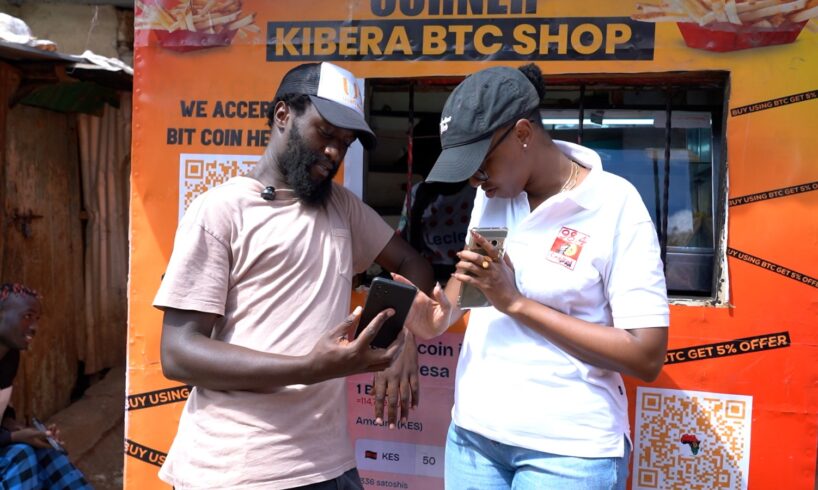
NAIROBI, Kenya, Nov 5 — At the edge of Soweto village in Kibera, a black water tank plastered with Bitcoin stickers towers above a buzzing car wash.
Young men in drenched T-shirts spray jets of water onto a dusty Toyota, their laughter rising over the hiss of hoses and the reggae beats echoing from a nearby kiosk. The smell of wet soil, soap, and fuel hangs thick in the humid air.
Above the tank, a line of mud-stained boots dangles from a wire, their worn soles swaying gently in the wind. To the untrained eye, they might seem like another relic of Nairobi’s informal sprawl. But here, in Soweto, they symbolise something deeper — a quiet declaration that their owners have hung up their crime-filled pasts and stepped into a new life powered by Bitcoin.
Under a wooden shed patched with tin sheets, customers wait as their cars and motorbikes are washed, witnessing not just a business, but a transformation.
“We started using Bitcoin because it’s fast, easy, and transparent,” says John Omondi, known locally as Jonte, the car wash chairman. “Most of my clients now pay through Bitcoin. We’ve trained them, and all the workers here have Bitcoin wallets. Even the bikers who come here spread the word.”
He unlocks his phone, revealing a freshly scanned QR code. “In a day, at least five clients pay through Bitcoin,” he adds. “It’s growing because people are curious — they want to learn.”
From Crime to Code
A few years ago, many of the young men scrubbing tyres today were robbing pedestrians in the same alleys. Mwanzo Mpya — a local NGO meaning A New Beginning — decided to rewrite that story.
“Most youths here used to die young, either in mob justice or police shootouts,” John says quietly, pointing at a separate pole where a lone pair of boots hangs in memory of a young man who relapsed into crime and was killed. “They didn’t have jobs, only desperation.”
The NGO started with twelve reformed youths; today, it has doubled that number — twenty-four young men and women who have “hung their boots” and found honest work.
“It was either jail or death,” says Tom (not his real name), one of the attendants. “Now I wake up knowing I’ll earn clean money in Bitcoin. My family respects me again. Those boots remind us who we were. They’re not decorations — they’re our testimony.”
For them, the Bitcoin car wash is more than a livelihood; it’s a bridge between their past and a new digital future.
Garbage, Greens, and the Gospel of Bitcoin
Beyond the car wash, other corners of Kibera are catching on. The rhythmic clatter of handcarts and the smell of refuse signal the arrival of garbage collectors — another group reformed through the Live Great Foundation, led by Lucy Omondi, who also runs Yummy Yummy Goodies.
“We’ve used Bitcoin for two years to pay and incentivise garbage collectors,” Lucy says. “It’s easier, transparent, and gives dignity to work that used to be ignored.”
Her foundation uses a Bitcoin map to track users and transactions across Soweto. “We can see who’s using Bitcoin, how much they earn, and where new users are coming from. It’s helping us onboard more people every month.”
To support financial literacy, they launched a Bitcoin Sacco where members can save or borrow digitally. “Even without a bank account, our members can save safely,” she says.
At the market’s edge, Stephanie, a fries vendor, flips sizzling potatoes as reggae hums through the alleys. Her kiosk bears a hand-drawn sign: Bitcoin Accepted Here.
“Transaction costs are low, and I don’t need a bank account — just my phone,” she says. “Even fifteen shillings can move digitally. That’s power.”
The Architects of Change
Behind much of this transformation stands Afribit, a youth-driven initiative led by Ronnie Mdawida and Programs Manager Mitch Odhiambo.
“Trust is key,” says Mitch. “Without it, no mama mboga or boda rider will touch Bitcoin. But once they see others using it, they follow. Peer learning drives everything.”
He says over 100 residents in Soweto West now use Bitcoin for groceries, rent, and school fees. “All of them are listed on our PTC Map — our digital directory of local bitcoiners.”
Safety in Digital Currency
For Onesmus Many, a garbage collector, Bitcoin has brought not just money but peace of mind.
“I feel safer with my money in Bitcoin,” he says. “Before, I’d hide cash in the house and lose it. Now, no one can rob me.”
At a vegetable stall, Dotea Anyim estimates that 10 per cent of her customers pay in Bitcoin. “It’s fast, cheap, and has no transaction costs,” she says.
Kenya now ranks among the top five countries globally for peer-to-peer Bitcoin transactions, according to the 2024 Chainalysis Global Crypto Adoption Index. With an estimated 4.4 million crypto users, much of this activity is driven by informal settlements like Kibera — communities locked out of traditional banking but eager for autonomy.
Regulation Meets Reality
Parliament in October passed the Virtual Asset Service Providers (VASP) Bill, 2025, giving the Central Bank of Kenya and the Capital Markets Authority oversight of crypto businesses.
The law requires exchanges and wallet providers to obtain licences and comply with consumer protection and anti-money-laundering rules.
But in Kibera, where more than 2,000 small transactions have already been processed through Bitcoin community wallets, the reality moves faster than regulation.
Here, Bitcoin is less about speculation and more about survival.
As the day fades, the young men hang their hoses to dry beneath the humming tank. Above them, the old, cracked boots sway softly in the dusk — not as ornaments, but as symbols of surrender and rebirth.
In the heart of Kibera, a digital coin has turned crime into commerce, and despair into dignity — one satoshi at a time.





